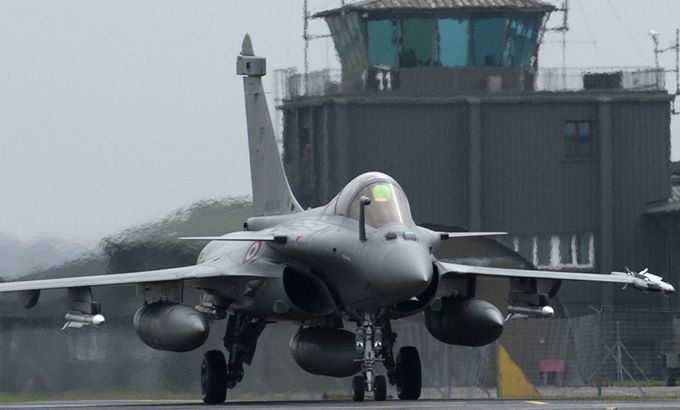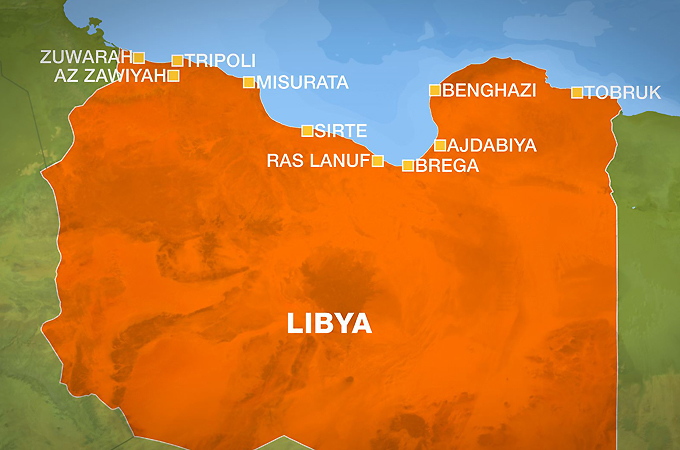Airstrikes begin on Libya targets
French warplanes attack tanks and US launches cruise missiles, as international military intervention begins.

French warplanes have hit four tanks used by forces loyal to Muammar Gaddafi on the outskirts of the opposition stronghold of Benghazi, on a day when opposition fighters in the city reported coming under constant artillery and mortar fire.
The US has also launched cruise missiles from ships based in the Mediterrannean Sea, and has taken the lead in military operations during the first phase, Kimberly Halkett, Al Jazeera”s correspondent in Washington DC reported.
The action marks the first international military moves against the Libyan leader, and it comes a day after the UN Security Council authorised a no-fly zone over the North African country.
 |
| Read the Libya Live Blog |
In the first phase of the operation, named “Odyssey Dawn”, the US will target Libyan Integrated Missile Defence Systems, mainly near Tripoli and Misurata, officials said. French aircraft had initiated operations by targetting Libyan air fields.
It is not clear when the second wave of operations will begin, but Al Jazeera”s Halkett reported that it would target Gaddafi’s ground forces and tanks.
Other countries involved in military operations at this stage include Canada, the United Kingdom, France and Italy.
A spokesman for the French military had confirmed that his country’s fighter jets have attacked a vehicle belonging to Gaddafi’s forces.
“The vehicle was clearly identified as being enemy,” army spokesman Colonel Thierry Burckhard said after the first UN-mandated air strike, describing the target as “a vehicle that was threatening the civilian population”.
Alain Juppe, the French foreign minister, said that operations “will continue over the next few days” until the Gaddafi government complies with UN Resolution 1973.
Libyan state television reported that civilian targets in Tripoli had been bombarded, as well as fuel stores in Misurata. The state news agency reported that there had been “civilian casualties as a result of this aggression”.
In a brief statement on state television, Muammar Gaddafi said that the air strikes marked the beginning of another “crusade”, adding that the Mediterranean and North Africa were being turned into a “battleground”.
Mohammad al-Zawi, the secretary-general of the Libyan parliament, told reporters late on Saturday that his country was facing a “barbaric” attack, and reiterated that Libyan forces had been observing a “ceasefire”.
The US says that no coalition military operations are currently planned for near the opposition stronghold of Benghazi, but that a no-fly zone will include Tripoli, Sabha, Natoura, Misurata and Benghazi.
Earlier on Saturday, pro-government forces had entered the western outskirts of the city, while French Rafale and Mirage fighter jets began reconnaissance overflights of “all Libyan territory”.
Ahmad Shabani, a spokesman for the Libyan opposition”s national council, told Al Jazeera the opposition was heartened by the move.
“We are very happy about that, hopefully it’s not late… and hopefully it makes a difference,” he said.
Meanwhile, four Al Jazeera journalists were detained in western Libya on Saturday. It was not immediately clear what charges, if any, they were being held on in Tripoli.
Fighting in Benghazi
Witnesses in Bengazi, in the east of the country, said they heard large explosions on Saturday. Al Jazeera’s correspondents in the city reported multiple explosions, plumes of smoke in the sky and a fighter jet belonging to the opposition getting shot down.
 |
Government troops reportedly bombed the southern Benghazi suburb of Goreshi among other places. Artillery and mortars were also fired in the centre of the city.
Mustafa Abdel Jalil, head of the opposition National Libyan Council, told Al Jazeera “there is a bombardment by artillery and rockets on all districts of Benghazi”.
James Bays, Al Jazeera””s correspondent in Benghazi, reported that while the air strikes by international planes were not evident, people were “cheered” by the report. He said, however, that there was a prevalent atmosphere of nervousness and fear, as well.
Government denials
The Libyan government firmly denied that it was attacking the city on Saturday. “There are no attacks whatesover on Benghazi. As we said, we are observing the ceasefire,” Musa Ibrahim, a government spokesman, told the Reuters news agency.
Khaled Kaim, Libya”s deputy foreign minister, told the BBC “the ceasefire is real, credible and solid. We are willing to receive [international] observers as soon as possible”.
On Saturday, Moussa Khoussa, the foreign minister, requested Ban Ki-moon, the United Nations chief, to send observers to monitor the “ceasefire”, saying that his country has “fulfilled all of its obligations to the international community”.
But Ibrahim Jibreel, a Libyan political activist, told Al Jazeera “we need to first consider the source” when receiving information about Libya. He said the government has “demonstrated their ability and willingness to lie time and time again”.
Besides Benghazi, fresh fighting was reported on Saturday in the nearby town of Ajdabiyah, while fierce battles raged in the western town of Misurata.
Reports also indicated that pro-Gaddafi forces had attacked the town of Az Zintan.
Meanwhile, Abdel Fatah Younis, the former interior minister who left Gaddafi””s government to join the opposition, has denied reports on Libyan state television that he has rejoined the government.
Ibrahim, the government spokesman, told reporters on Saturday that Gaddafi had sent urgent messages to the US president, the French president and the British prime minister, as well as the secretary-general of the UN.
Meanwhile, in the capital, Tripoli, pro-Gaddafi demonstrators held rallies, with several hundred gathered at his Bab al-Aziziyah palace saying that they were there to protect the site from any possible air strikes, Al Jazeera correspondent Anita McNaught reported.
The International Committee of the Red Cross (ICRC) warned on Saturday that civilians were at high risk, and called upon all parties involved to respect international humanitarian law.
“As airstrikes in Libya by international forces begin, the ICRC calls upon all parties – the international forces, the Libyan government forces, and the armed opposition – to abide strictly by the rules and principles of
international humanitarian law,” the ICRC said in a statement.